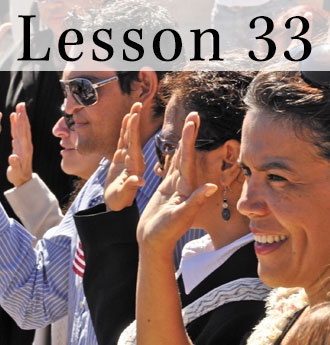
Lesson Purpose
When you have finished this lesson, you should be able to explain the meaning of citizenship in the United States, the ways Americans become citizens, and why all American citizens are citizens both of their states and their nation. You also should be able to identify essential rights and responsibilities of citizens, and why citizenship is particularly complicated for Native Americans. You should be able to describe the process of naturalization, differences between citizens and resident aliens, and how citizenship can be lost. Finally, you should be able to evaluate, take, and defend positions on the legal and moral rights and obligations of citizens.
Lesson Objectives
- explain the meaning of citizenship in the United States, the ways Americans become citizens, and why all American citizens are citizens both of their states and their nation,
- identify essential rights and responsibilities of citizens, and why citizenship is particularly complicated for Native Americans,
- describe the process of naturalization, differences between citizens and resident aliens, and how citizenship can be lost, and
- evaluate, take, and defend positions on the legal and moral rights and obligations of citizens.
Lesson Terms
Lesson Biographies
Lesson Court Cases
Case Summary
In September 1831, Samuel A. Worcester and several others, all non-Native Americans, were indicted in the Gwinnett county supreme court in Georgia for "residing within the limits of the Cherokee nation without a license" and "without having taken the oath to support and defend the constitution and laws of the state of Georgia." They were indicted under an 1830 act of the Georgia legislature titled, "an act to prevent the exercise of assumed and arbitrary power by all persons, under pretext of authority from the Cherokee Indians." Worcester argued that the state could not maintain the prosecution because the statute violated the Constitution, treaties between the United States and the Cherokee nation, and an act of Congress titled, "an act to regulate trade and intercourse with the Indian tribes." Worcester was convicted and sentenced to "hard labour in the penitentiary for four years."
Question(s)
Does the state of Georgia have the authority to regulate interactions between citizens of its state and members of the Cherokee Nation?
Answer(s)
No. In an opinion delivered by Chief Justice John Marshall, the Court held that the Georgia act under which Worcester was prosecuted violated the Constitution, treaties, and laws of the United States. Noting that the "treaties and laws of the United States contemplate the Indian territory as completely separated from that of the states; and provide that all intercourse with them shall be carried on exclusively by the government of the union," Chief Justice Marshall argued, "The Cherokee nation, then, is a distinct community occupying its own territory in which the laws of Georgia can have no force. The whole intercourse between the United States and this nation, is, by our constitution and laws, vested in the government of the United States." The Georgia act thus interfered with the federal government's authority and was unconstitutional. Justice Henry Baldwin dissented for procedural reasons and on the merits.
See: The Oyez Project, Worcester v. Georgia, 31 U.S. 515 (1832)
Lesson Primary Sources
Aristotle's work on such topics as the political community, economics, property rights, citizenship, leadership, constitutions and the ideal state. He critiques the ideas in Plato's Republic and examines the existing thoughts and types of government, as well as discussing his notions of ideal society.






